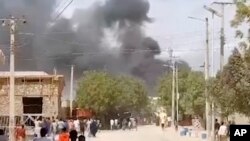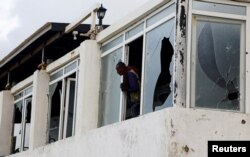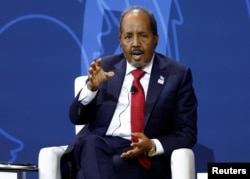Emergency workers used bulldozers to clear the debris as they retrieved bodies and rescued people trapped under rubble after the blast in the town of Beledweyne in Hiran region.
"What has happened here is a heinous act," Abdulahi Ahmed Malim, the governor of Hiran, told reporters at the scene.
"This was a disaster today and the damage it has inflicted is not small, it destroyed the whole area," he said.
"We have recovered the dead bodies of 13 people, most of them civilians who stayed nearby," Ahmed Yare Adan, a local police officer, told AFP by phone.
"There are about 45 wounded people admitted in medical facilities... some of these people are seriously wounded and they are all civilians," he said.
The attack came after Somalia's beleaguered government admitted to suffering "several significant setbacks" in its fight against Al-Shabaab militants.
The Islamist fighters have waged an insurgency for over 15 years to overthrow the fragile internationally backed government in Mogadishu.
There was no immediate claim of responsibility for Saturday's bombing.
- 'Immense destruction' -
Police officer Abdukadir Yasin, who rushed to the scene after the blast, said rescuers were pulling wounded victims to safety from under the rubble.
"The destruction caused is immense, more than 10 dead bodies were confirmed already and the death toll can be higher," he said.
Residents told AFP the explosion caused houses to collapse, burying people under debris while they were at home.
"The whole town is shocked," said Abdifatah Hassan, a resident of the neighbourhood.
An African Union (AU) force deployed in Somalia in 2007 with a six-month mandate but still remains on the ground. The government is now seeking to delay a planned reduction of foreign troops by three months.
UN resolutions call for the African Union Transition in Somalia (ATMIS) force to be reduced to zero by the end of next year, handing over security to the Somali army and police.
Somali troops launched a major offensive against the Al-Qaeda affiliated Al-Shabaab in central Somalia in August last year. They joined forces with local clan militias in an operation backed by the AU force and US air strikes.
- 'All-out war' -
Somali President Hassan Sheikh Mohamud took office in May last year vowing "all-out war" against Al-Shabaab, who were driven from Mogadishu in 2011 but control swathes of the countryside.
Mohamud, who has recently been visiting the frontline, said in August that government would "eliminate" the jihadists by the end of the year.
But Somalia's national security adviser recently wrote to the United Nations requesting a 90-day delay to the planned pullout of 3,000 AU troops by the end of September.
In the letter, seen by AFP, he said the government had "managed to re-liberate towns, villages and critical supply routes" during its offensive but had suffered "several significant setbacks" since late August.
"This unforeseen turn of events has stretched our military forces thin, exposed vulnerabilities in our frontlines and necessitated a thorough reorganisation to ensure we maintain our momentum in countering the Al-Shabaab threat," the letter said.



Forum